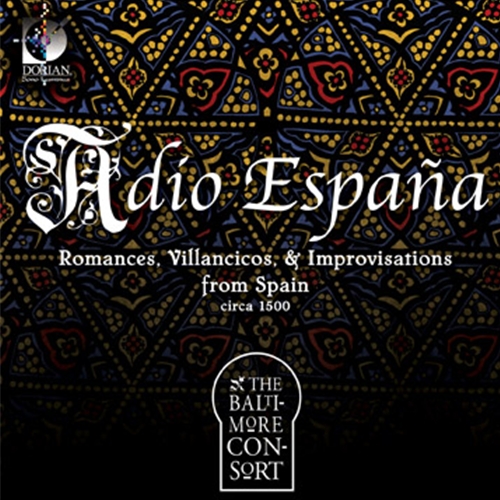
Adio España
This program will take you on a musical journey through the fascinating intercultural history of the late 15th and early 16th century Spain. Heroic ballads celebrating the battles between Christians and Moors, salacious villancicos, wild improvisations, and traditional Sephardic romances are performed by members of the Baltimore Consort. They play a vast array of period instruments coupled with vocals by sensational Brazillan singer José Lemos. This is the 14th release by the Baltimore Consort and the first release of entirely new material in over 5 years.
Tracks
- Morenica a mí me llaman
- Avrix mi galanica (Let Me In, My Love)
- La mañana de San Juan
- Recercada 'La Spagna', for vihuela (from Trattado de Glosas)
- Alta à 3 (Danza sobre La Spagna)
- Tiento
- Trieste estava el Rey David, song for voice & vihuela
- Riu, riu, chiu!, carol (Spanish)
- Tres Morillas M'Enamoran
- Di, perra mora (Instrumental)
- Quinta pars (Ruggiero), for vihuela (from Trattado de Glosas)
- Recercada No. 1 (Passamezzo antiguo), for vihuela (from Trattado de Glosas)
- Recercada No. 2 (Passamezzo moderno), for vihuela (from Trattado de Glosas)
- ¿Qu'es de ti, desconsolado?, cancionero (from Cancionero de Palacio)
- Levanta, Pascual, cancionero (from Cancionero de Palacio)
- Morenica, dame un beso, for vihuela
- Una sañosa porfía, cancionero (from Cancionero de Palacio)
- Sagaleja del Casar, for vihuela (from Cancionero de Palacio)
- Cucú, cucú, cucúcu, cancionero (from Cancionero de Palacio)
- Calabaça, no sé, buen amor (Pumpkin, I don't know, my love), villancico (from Cancionero de Palacio)
- Tu Madre cuando Te Parió
- Yo me soy la morenica (I am the little dark girl), villancico
- Ay triste que vengo, cancionero for 3 voices (from Cancionero de Palacio)
- Oy comamos y bebamos, cancionero (from Cancionero de Palacio)
- Baila nena (Dance little girl), folk song (Galician)
